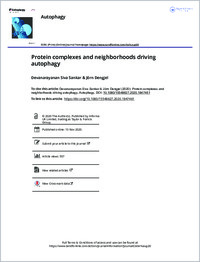Protein complexes and neighborhoods driving autophagy
- Siva Sankar, Devanarayanan Department of Biology, University of Fribourg , Fribourg, Switzerland
- Dengjel, Jörn Department of Biology, University of Fribourg , Fribourg, Switzerland
-
13.11.2020
Published in:
- Autophagy. - 2020, vol. 0, no. 0, p. 1–17
English
Autophagy summarizes evolutionarily conserved, intracellular degradation processes targeting cytoplasmic material for lysosomal degradation. These encompass constitutive processes as well as stress responses, which are often found dysregulated in diseases. Autophagy pathways help in the clearance of damaged organelles, protein aggregates and macromolecules, mediating their recycling and maintaining cellular homeostasis. Protein-protein interaction networks contribute to autophagosome biogenesis, substrate loading, vesicular trafficking and fusion, protein translocations across membranes and degradation in lysosomes. Hypothesis-free proteomic approaches tremendously helped in the functional characterization of protein-protein interactions to uncover molecular mechanisms regulating autophagy. In this review, we elaborate on the importance of understanding protein-protein- interactions of varying affinities and on the strengths of mass spectrometry-based proteomic approaches to study these, generating new mechanistic insights into autophagy regulation. We discuss in detail affinity purification approaches and recent developments in proximity labeling coupled to mass spectrometry, which uncovered molecular principles of autophagy mechanisms.
- Faculty
- Faculté des sciences et de médecine
- Department
- Département de Biologie
- Language
-
- English
- Classification
- Biological sciences
- License
- License undefined
- Identifiers
-
- RERO DOC 329723
- DOI 10.1080/15548627.2020.1847461
- Persistent URL
- https://folia.unifr.ch/unifr/documents/309038
Statistics
Document views: 71
File downloads:
- den_pcn.pdf: 169
